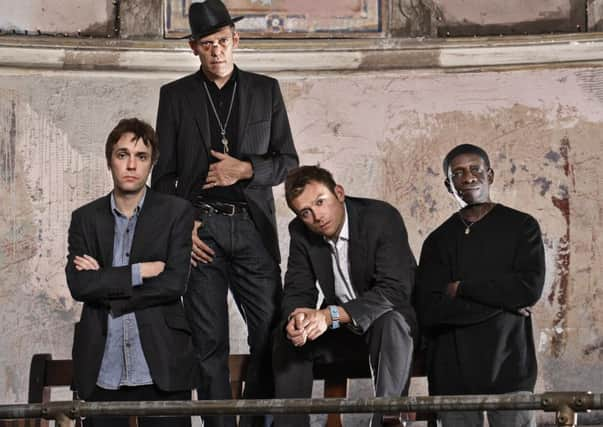Album reviews: The Good, The Bad and the Queen | Glen Campbell | Joseph Malik


The Good, the Bad and the Queen: Merrie Land (Studio 13) ****
Glen Campbell: Sings for the King (Capitol/UMC) ***
Joseph Malik: Diverse Part 2 (Ramrock Red Records) ****
Of the many musical faces of Damon Albarn, The Good, The Bad and the Queen has to date been the most enigmatic. A group with no name, they said, but lashings of pedigree, namely Clash bassist Paul Simonon, former Verve guitarist Simon Tong and legendary Afrobeat drummer Tony Allen, they produced one album, The Good, The Bad and the Queen, a stylised dub pop meditation on London, in 2007 and haven’t been seen since.
Advertisement
Hide AdNow they re-emerge, adopting the name of that debut as their own, to sing the Brexit blues and hail a mythical Britain called Merrie Land with its epicentre at Blackpool pier. This is Albarn’s whimsical jumping off point for an ambivalent farewell tour of a bygone notion of a nation which finds musical form in this otherworldly, conflicted break-up letter with our continental partners.
“This is not rhetoric, it comes from my heart,” he declares on the beautiful but desolate title track, circling sadly like the lonely carousel at the end of the pier as it reveals a succession of images from Silver Jubilee mugs to plastic pollution and asks forlornly “are we green, are we pleasant?”
Merrie Land is low on proselytising and rich in allusion. Gun to the Head portrays the quirks of local by-laws in a poignant pub rock singalong-meets-60s pop reverie. The Great Fire is a psychedelic dub odyssey along Blackpool promenade, told in impressionistic snapshots. There is further coastal imagery on Drifters and Trawlers, a twinkling take on
The Clash’s poppier moments, and a more pronounced roots reggae rhythm on The Truce of Twilight, which plays with rarefied folkloric imagery.
A trip to north Wales inspires Lady Boston, which culminates in a choral singalong, in Welsh, with jazz piano and steam organ accompaniment, while Nineteen Seventeen is the product of a contemplative train journey through northern France, noting the common landscape and chewing over Britain’s war record.
The haunted carousel turns again on The Last Man to Leave, a dystopian post-Brexit fever dream (“we don’t want you anymore, we like the bed that we’ve made to lie in much better thank you”) but, in the end, Albarn is out of allusions, simply admitting “it’s really sad” on the valedictory lament, The Poison Tree.
Advertisement
Hide AdBefore he established himself as a solo star in his own right, Glen Campbell made his musical living as a gifted session guitarist and demo singer. The newly compiled Glen Campbell Sings for the King is a curiosity in the Campbell canon, comprising recordings made in
1964-68 for Elvis Presley’s consideration in which Campbell deliberately imitates the King’s tone and phrasing.
Advertisement
Hide AdPresley went on to record his takes on the pious hymnal We Call On Him, the mischievous country rock’n’roll of Easy Come, Easy Go, the smooth easy listening balladry of I’ll Never Know and the beach blanket bingo of Do the Clam, but the songs he didn’t choose are arguably more intriguing. The low-slung rhythm’n’blues swagger of Any Old Time and the Latin-flavoured Magic Fire teeter on the cusp of cheesy and sultry, but there is a sense of the artist Campbell was to become on the luscious croon Restless.
Edinburgh-based soul singer, DJ and producer Joseph Malik makes a belated follow-up to his seductive 2002 album Diverse, which is aptly named for its soothing exploration of soul in its manifold forms, from the old school gospel R&B sashay of Take a Left to the chamber soul of Love Bound. The pastoral plea of But I’m Lost Not Found is reprised later as a peppy rhythm’n’blues number and there are a handful of tasty space jazz instrumentals which testify to the influence of Kamasi Washington as much as Marvin Gaye.
CLASSICAL
Mahler: Symphony No 5 (Harmonia Mundi) ****
Daniel Harding’s new Mahler 5 recording with the Swedish Radio Symphony Orchestra gets right to the heart of this symphony’s complex darkness-to-light journey. In that sense it isn’t just a single mountain to climb but a whole range full of peaks and troughs. Harding tackles this battle of extremes with self-assurance. From the outset he unleashes a granite-like solidity which holds firm, even with the wild tempo changes and frenetic spirit that threaten its stability. Gutsy playing from the Swedish orchestra, venomous at times, heartfelt at others, adds visceral definition to the mix. The playfulness of the scherzo is teasingly tempered with a judicious helping of decadence; the famous Adagietto is beautifully expressed, a floating sense of resigned optimism at its heart. Then the finale, a gripping tour de force, the integrity of which Harding confronts full on, never with gratuitous abandon, always with the final moment of exhilaration in view. - Ken Walton
FOLK
Bert Jansch: Just a Simple Soul (BMG) ****
Enigmatic yet hugely influential, Glasgow-born guitarist and singer Bert Jansch emerged during the Sixties and went on to be idolised by generations, including Bernard Butler of Suede, who has compiled this comprehensive double album. The 39 tracks span more than four decades, including, from his 1965 debut, that hypnotic spin of Davey Graham’s Angie, a rite of passage for any self-respecting fingerpicker, as well as Blackwaterside, “borrowed” by Led Zeppelin, and the plaintive vocal timbre of Needle of Death. Pentangle co-guitarist John Renbourn makes an appearance on Soho while the rumble of colleagues Danny Thompson and Terry Cox drives Poison, although, frustratingly, the sleeve notes don’t always credit accompanists. Delights from his more obscure years include the Kittiwake and the edgy blues of When the Circus Comes to Town, while The Black Swan, title track of his final album in 2006, has a melancholy beauty. - Jim Gilchrist